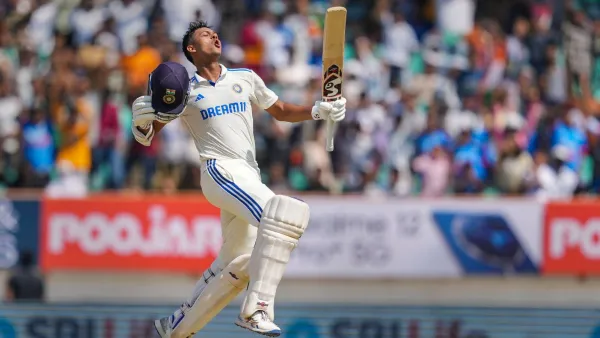The success of Yashasvi Jaiswal is a tribute to Mumbai. Yashasvi Jaiswal, the rising star of India, deserves praise for both his runs and his technical accuracy, but he also deserves credit for his hometown of Mumbai, which has assiduously preserved its cricketing history like a priceless family heirloom. The foundation of cricket has not been uprooted by the wild winds of change in its original Indian home. Mumbai is the reason that Yashasvi would never have happened.
This true story hardly seems real. He had come alone, at the age of eleven, from Bhadohi in Uttar Pradesh, the city that Bollywood has always claimed is the embodiment of every dream, as the son of a small-time shopkeeper. Yashavi was determined and goal-oriented; he wanted to play for India. In the end, he did. Although coaches, mentors, and guardians provided assistance, a more encouraging larger picture becomes visible when one looks closer.
A system that still relies on meritocracy accepted Yashasvi, the outsider with undeveloped talent. Mumbai still has a strong commitment to cricket and developing young players, in contrast to Delhi, the former cricketing powerhouse. The young Yashasvi would likely still be hauling his kit bag to Kotla for some u-23 trials if he had made the shorter journey from home to Delhi.
The maidaans have been commercialized over time, just like everything else, but those anonymous benefactors, former players who enjoy discussing cricket, unsung coaches, and impartial selectors who take pleasure in developing the next generation of cricketers still call them home. For many people, passing the baton still entails responsibilities rather than being a transaction or an obligation. This has guaranteed that front page photos of batting prodigies with their whites tarnished by maidaan red clay will continue to appear in Mumbai newspapers.
With an abundance of experience, the most successful first-class side is the former breeding ground for Indian batting. In his book Sunny Days, Gavaskar tells the story of a houseguest who came to deliver a wedding invitation but left with a batting tip that he used throughout his career.
“My father stopped me once as I was leaving the house to go to a match to introduce me to Mr. Kamal Bhandarkar, a former Maharashtra player who is always ready to coach. He had come to extend an invitation to a wedding. I showed him my forward defence at his request. When I did, Mr. Bhandarkar pointed out that there was a chance the ball would be deflected towards the slips because my bat was at an angle, writes Gavaskar. He continues by saying that Mr. Bhandarkar was the type of person who was willing to spend “all night discussing cricketing problems one might have.”
The committed mentors like Mr. Bhandarkars were essential to Yashasvi’s development. Yashavi didn’t have an uncle who played Test cricket like Madhav Mantri, whose India cap he could look at and dream about, like Gavaskar did. And unlike Ajit Tendulkar, he didn’t have an older brother. His contemporaries, Sarfraz Khan, Arman Jaffer, and Prithvi Shaw, all had “Cricket Fathers” who measured each step they took in the cricket arena. There was a generous cricket community and a kind city for the teenage migrant who sold pani puri to make ends meet while living in the maidaan tent with ground staff.
The Mumbai batsman’s innate desire for runs  is evident in Yashasvi as well. For those who want to play Kanga League for the rest of their lives, a mere hundred would suffice due to the fierce competition and high bar. One needs Grand Daddy hundreds to get the office-goers at Churchgate to stop and peek through the fence to watch a batsman play at Azad Maidaan. Yashasvi’s first home Test series saw him score two double hundreds thanks to that hunger.
is evident in Yashasvi as well. For those who want to play Kanga League for the rest of their lives, a mere hundred would suffice due to the fierce competition and high bar. One needs Grand Daddy hundreds to get the office-goers at Churchgate to stop and peek through the fence to watch a batsman play at Azad Maidaan. Yashasvi’s first home Test series saw him score two double hundreds thanks to that hunger.
Another quality that the city instills in its batsmen is focus and concentration. Gavaskar would keep his head still by standing in slippers. He avoided watching movies because he was told it would damage his eyesight, and he would even read books with larger font sizes. You have to watch out for the devil that lurks in the details when you have plans to bat flawlessly for days. Yashasvi is a very secure snare. Mumbai’s under-19 coach has a noteworthy quote in his debut major story, which was written by Devendra Pandey, a reporter for The Indian Express. The teen’s “extraordinary game sense and unflappable focus” are the subject of the story.
Yashasvi’s dream went beyond simply owning a home in Mumbai, as it does for most migrants. He desired to be in the vicinity of batting greats and have his own spot on the Indian team. Again, it’s a characteristic of Mumbai. Tendulkar knew he would undoubtedly play for India when he was just 13 years old. Similar to those exceptional individuals, Yashasvi did not view a Mumbai cap or the Rajasthan Royals’ “retained star” status, which pays Rs 4 crore annually, as a destination. Just like every Mumbaikar, he too worked hard to meet those Test cap targets.
He doesn’t spend his off-season lounging on his profits. He leaves for Talegaon, a village in the Wardha district near Nagpur, where his franchise, the Rajasthan Royals, has a training facility, far away from the glamour and diverting opportunities that Mumbai has to offer. It offers clean, fresh canteen food and cozy lodging with the extras of a low-cost hotel. In terms of nightlife, the town is known for its ironsmiths who create lethal daggers, but other than that, not much has been reported in the news regarding farmer suicides. Mumbai batsmen have it all when it comes to the cricket facilities: a variety of pitches and an abundance of net bowlers.
Yashavi has accrued those all-important 10,000 hours of batting practice, as demonstrated by his numbers and anecdotal evidence. Malcolm Gladwell, the celebrated author, has calculated this number. According to him, an athlete’s journey to greatness begins with those numerous hours of training. However, in contemporary sports, a rider is required, even for Mumbai’s batsmen. Being a great player is not an easy feat, as witnessed by the fate of a close friend of Tendulkar’s who scored a double hundred runs against England. In addition to 10,000 hours, a sportsman must have endured the required 1000 days of celebrity in order to be considered a true great. With this England series, Yashasvi—whose Sanskrit name means “successful”—has begun the countdown.
































